Why I Choreograph: Elizabeth Streb
Celebrated as a maverick performer and innovator, Elizabeth Streb pioneered a form of choreography that crosses daredevil action with exhilarating rhythmic momentum. Audiences are awed by the antigravity feats of her fearless group, STREB Extreme Action Company. In 2003, Streb established S.L.A.M. (STREB Lab for Action Mechanics) in Brooklyn, NY, and has appeared on many TV news and talk shows. Her book,
How to Become an Extreme Action Hero, was published by The Feminist Press in 2010.
Riding a motorcycle was as much a part of Streb’s training as dance class at SUNY Brockport. Her work has won many awards, including a MacArthur “genius” grant. This spring she returns to the Bay Area to serve as mentor in the CHIME program, founded by Margaret Jenkins, with whom she once danced. In July, Streb will choreograph for the cultural segment of the 2012 Olympics in London.
Why? I can’t not. I try to claim ignorance in order to see the invisible, do the impossible, notice a moment that no one ever has before. I try. The method I employ to choreograph is to construct and answer necessary and sufficient questions about motion that have an immediate visceral and kinesthetic effect on spectators. I attempt to recalibrate the syntax, morphology, and grammar of the fundamental, indivisible aspects of motion on earth.
These aspects include time, space, body, and forces. We notice movement as somehow connected to time; at least it’s necessary for time to pass. It’s all we have, the spots in time that haven’t passed yet and when they do, we keep missing them. Would stillness cause time to evaporate, if movement “is” time? Is time an act that we need to pay faster and deeper attention to, but we just do not know how?
My ultimate project is to develop and codify a new lexicon, a nomenclature that “is” motion, is about motion, and absolutely no other subject. This venture includes exactly what the human body allows to happen to it, what it believes is OK to endure. I suspect that the actual content of action, of movement, is too dangerous for the human to ever really encounter while alone in a room, wondering.
Action is something that is already gone, and that you couldn’t see to begin with (you could feel it, though). My questions involve time, action, change, alteration, and force. What is time? Is it just a feeling? Is it what causes us to look back to the past? Is it the cause of what just happened?
Is it to wonder about the future—the only thing you can’t regret? What is the potential “nature” of the content of action? What is the “when” of it? Does physicality have a unique temporality?
Where is the “where” of it? Could this “where” be unrecognizable and imperceptible? Can the occupation of space become clearer, more specific with its own taxonomy, with its own morphology? Are unnamed bodies of knowledge invisible? How can a human, animal, or thing perform these acts? Or do they just happen to you? Are they survivable?
I want to establish rubrics for a few left-out physical-rule systems: 1. A codification for a pure, physically based rhythm structure (the iambic pentameter for action); 2. An explosion system for weight change that enables the body to move to another place by popping its unit mass onto other surfaces than the bottoms of one’s feet; 3. To learn to fly.
A few of my goals: To go so fast that the flesh is merged into air and you can’t be seen, to defy the hegemony of the ground, to have spatial trajectories be remembered the way melodies are, to design a condition that is unrecognizable, to look at a substance and its behavior and not understand its physicality, to achieve a way of moving that is so extreme and baffling that the witnesses fall down from pure confusion.
More questions: What is the true “content” of movement and what meaning can it hold? What can it hold that no other system can—not language, words, film, music, sound, or images? What is it that movement can do that absolutely nothing else on earth can, and how long does it take to achieve this—a second, a minute, 10 minutes?
Why do I choreograph? To ascertain what movement does better than any other discipline. Do only this with it, then.
Photo by Mary Ellen Mark, Courtesy Streb.




